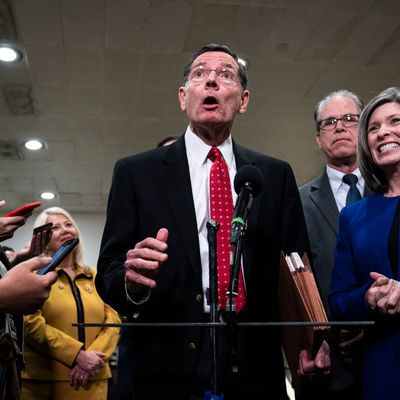
In the wake of a report on Sunday revealing that John Bolton’s account of the Ukraine scandal directly undermines the argument of the president’s legal team, GOP leaders spent the second day of the impeachment defense team’s opening statements side-stepping the minefield of potential testimony from the former national security adviser.
The least helpful political comparison made on Monday came from Wyoming Senator John Barrasso — unless, of course, he wanted to reinforce the GOP’s reputation as the party of procedural blockage. “I think there is going to be something new coming out every day, very similar from what we saw in the Kavanaugh trial,” he told reporters. “New information, old information told in a different way, to inflame emotions and influence the outcome.” Perhaps comparing a trial in which the administration blocked testimony and limited the admission of first-hand accounts to a Supreme Court nomination in which the Republican-controlled Senate rejected requests for outside witnesses and stymied a credible accuser’s attempt to testify about an allegation of sexual misconduct may not be the sterling comparison that Barrasso thinks it is.
The award for the defense with the least amount of credible evidence goes to Jane Raskin, who claimed that Trump surrogate Rudy Giuliani was a “minor player” in the Ukraine scandal, serving as a “shiny object” for Democrats to focus on. Her depiction of Giuliani acting solely as the president’s personal lawyer — rather than as a one-man, parallel State department — certainly goes against the record of multiple impeachment inquiry witnesses. And New York’s Jonathan Chait notes the high level of absurdity behind Raskin’s claim that Giuliani was the anti-corruption lion of Kiev:
Raskin portrayed Giuliani as having sought to fight corruption in Ukraine, calling him “an internationally recognized expert on fighting corruption.” This is an even more absurd inversion of reality than the team’s depiction of Biden. Giuliani hired the hustler Lev Parnas and the Mafia-linked operator Igor Fruman, who used their connections to Trump to pursue their own business deals in the country. Giuliani and his partners were not only shaking down Ukraine for investigations on Trump’s domestic enemies, they were also shaking it down to line their own pockets. (Federal investigators are looking into whether Giuliani was trying to get his own piece of the gas business in Ukraine, which Rudy denies, but in any case, he was getting paid to serve as the political muscle for Parnas and Fruman.)
Indeed, in case nobody’s noticed, Rudy’s partners are facing federal charges for their scheme, and Rudy himself is the reported target of a federal investigation.
Though it wasn’t an immediate response to Bolton’s faux-revelation of an impeachable detail that was pretty much known already, Ken Starr offered a clueless lamentation that impeachment was being called too often in contemporary politics. “At this particular juncture in America’s history, the Senate is being called to sit as the high court of impeachment all too frequently,” said Starr, who spent years of his life leading an investigation that led to the impeachment of President Clinton. “In the House, resolution after resolution, month after month has called for the president’s impeachment. How did we get here?” Sometimes the answers to life’s biggest questions can be found within.
Starr’s fellow defense-team members Pam Bondi and Eric Herschmann apparently weren’t paying attention to the impeachment veteran’s anxiety about over-employing the constitutional process: Hours later, they argued that President Obama should have been subject to an impeachment inquiry for a potential abuse of power.






























